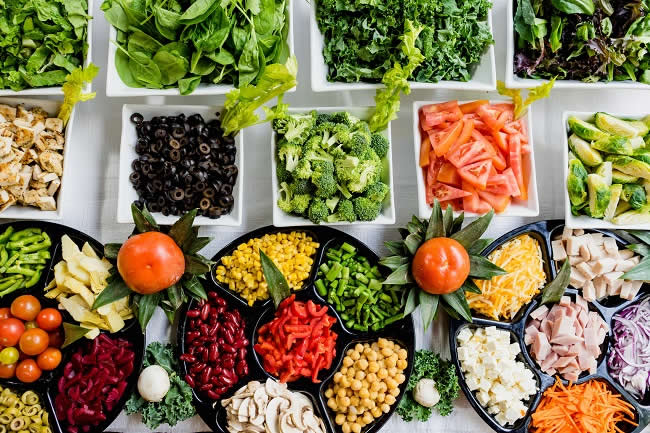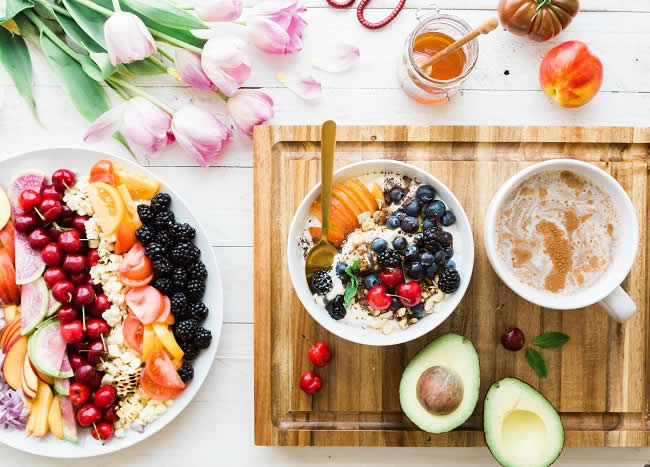Positive Health Online
Your Country

How to have a Healthy Gut
by AXA PPP healthcare(more info)
listed in colon health, originally published in issue 261 - March 2020
Good digestive (gut) health is the cornerstone of our immune system, helping to fend off illnesses and help us thrive. It will come as no surprise, then, that looking after our guts and understanding a bit more about what they do for us is an important part in staying healthy.
Kick-started the moment we start chewing – our digestive organs (intestines and bowels – aka guts) turn food and liquid into energy, providing nourishment for our body so we can function at our best. In other words, our diet – what we eat and drink – plays a massive role in keeping our guts in check.
Other lifestyle factors can also affect our digestive health, such as how physically active we are, whether we smoke, and our emotions. The term ‘gut feeling’ originally came about because our gut is sensitive to emotions, stress, anxiety and depression – these all have a direct effect on the digestive tract (if you’ve experienced butterflies, you’ll know). It's medically proven that people who do regular physical activity have up to a 50% lower risk of colon cancer.

https://unsplash.com/photos/4_jhDO54BYg
“Our gut health reflects our lifestyle habits, so making healthier lifestyle choices when we can is one of the best ways to avoid preventable ill-health. Looking at what we put into our mouths is a good place to start, so eating lots of fibre-rich food every day should be first on the list!
“Fruit, vegetables and wholegrains, such as brown rice, whole-wheat bread and breakfast cereals, oats and barley are excellent sources of fibre that move through the gut quickly – helping us stay ‘regular’”, says Rajkeeran Kundhi, Associate Registered Nutritionist at AXA PPP healthcare.
The shorter the time that waste (poo) is left in the colon, the less likely the bowel is to be exposed to toxic chemicals which may contribute to an increased risk of bowel cancer. These vitamin, mineral, and fibre-rich wholefoods also contain anti-oxidants, which can help protect against cell damage.
“Eating a variety of brightly coloured plant foods ensures that plenty of important antioxidants are included in your diet”, says Rajkeeran.
Fibre-Rich Sources of Antioxidant Vitamins Include
- Carotenoids
Found in carrots, red peppers, tomatoes, pumpkins, spinach, kale, broccoli, watermelon, mangoes and corn - Flavonoids
Found in raspberries, blueberries, blackberries, onions and beans - Selenium
Found in brazil nuts, whole wheat, eggs and fish - Folate
Found in green leafy vegetables, beans, lentils, nuts and wholegrains - Vitamin C
Vitamin C is found in broccoli, cabbage, spinach, citrus fruits, red and green peppers, kiwi fruit, strawberries, sweet potatoes and tomatoes - Vitamin E
Vitamin E is found in nuts, seeds, wheatgerm, whole grains and avocados.

https://unsplash.com/photos/nTZOILVZuOg
Digestive System-Friendly Foods
- Water
A great deal of our daily requirement for water is used for digestion and the elimination of waste products from the body.
“Drinking at least 2 litres, or 6-8 glasses a day is important not only to help stay well hydrated but also help to prevent constipation, which is one of the first symptoms of habitual dehydration”, says Rajkeeran
“Many of us may exist in a semi-dehydrated state, which can often lead to niggling health problems that we might not realise are connected, such as indigestion, bloating, irregular bowel movements, as well as headaches and lack of concentration. The key to staying hydrated is to drink little and often throughout the day.”
Read more about the importance of hydration here. - Rice
While not everyone needs to avoid gluten, some may benefit by choosing non-gluten cereal grains like rice more often, as these are more easily digested and gentler on the gut. The starch in rice, particularly Basmati rice, is digested and absorbed slowly, thereby providing a steady release of glucose into the blood for sustained energy. Rice has long been used in natural medicine to treat digestive disorders ranging from indigestion to diverticular disease (a condition affecting the large bowel or colon). It is also believed to relieve mild cases of diarrhoea and constipation. - Ginger
There are many health benefits associated with ginger. Compounds called gingerols have anti-inflammatory properties, helping reduce pain in conditions such as arthritis. Ginger root has been historically associated with helping to soothe the digestive system and stomach pains by eliminating excess gas, as well as being found to reduce symptoms of nausea and vomiting. - Try adding fresh ginger to hot water to make a warming drink, perfect for a cold day!
- Pears
Pears are known to be one of the least allergenic foods and are very gentle on the gut, so are well tolerated by almost everyone. Pears are good sources of the soluble fibre pectin and of bioflavonoids, which are powerful antioxidants and may protect against a range of diseases. Pears also make a useful contribution to vitamin C and potassium intake, which can help to regulate blood pressure. - Probiotics
Probiotics, or 'friendly bacteria' as they are often known, help to maintain a healthy balance of so-called good and bad bacteria in our gut, This balance of microbes, also known as the gut flora, can be thrown out by a wide range of circumstances, including the use of drugs, excess alcohol, stress, disease or exposure to environmental toxins. When this happens it can lead to an increase in the harmful bacteria that cause ill-health.
Probiotics are often recommended for problems such as diarrhoea or irritable bowel syndrome (IBS), or after a course of antibiotics that has resulted in constipation.
Fermented foods such as kimchi, sauerkraut, yogurt, tempeh, miso, and kefir are great dietary sources of probiotics.
Raj says: “Including plain live yogurt in your diet, subbing coconut milk with it in curry, or adding it to fruit or cereals will give you what you need. You don’t necessarily need branded products specifically marketed as ‘gut friendly”. - Prebiotics
Prebiotics are nutrients and constituents of food that our gut flora feed upon, thus increasing the number of microbes found in the gut. Prebiotics include compounds known as fructo-oligosaccharides, which are found naturally in many complex carbohydrates and plants, including leeks, onions, wheat, garlic, chicory root and artichokes. The prebiotic ‘inulin’ is now being added to some brands of breads and cereals.
Prebiotics helps the growth of the 'friendly bacteria' in the gut, which in turn aids digestion, improves gut health and boosts the immune system. It may also help reduce the severity of food poisoning and the effects of food intolerance. - Teas
Peppermint tea is thought to help food digest after a meal, preventing bloating and heartburn. Ginger tea may help upset stomachs and prevent nausea, while soothing and comforting fennel or chamomile teas may help with symptoms of IBS, which is strongly associated with stress. - Key Takeaway
Raj says: “Digestive health is so important but often overlooked. Our diet plays a key role in healthy digestion - not forgetting other factors such as regular physical activity, limiting toxins from alcohol intake and cigarette smoking.
“It’s easy to be seduced by “detoxing” products found online in the form of teas, powders or pills, but these ‘quick fixes’ aren’t backed by science, can be misleading and in no way substitute a healthy balanced diet.
Comments:
-
No Article Comments available